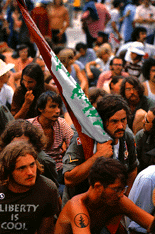 |
TODAY Wednesday 13 August 1997 Each weekday. Conn Nugent on what's new in the world, on the site. |
newsroom
 |
TODAY Wednesday 13 August 1997 Each weekday. Conn Nugent on what's new in the world, on the site. |
TODAY IN THE WORLD: Environmentalism for Grown-Ups
A: Drive your car.
Q: What is the most environmentally significant thing you do?A: Nothing.
Q: What's almost as important?The link between transportation and the environment is intimate and crucial. Motor vehicles are the main sources of air pollution in the United States. They are enormous sources of water pollution, via gasoline runoff and seepage from tanks, batteries, and old tires. They are the biggest contributors to acid rain. They emit one-third of the carbon dioxide that causes global warming. They induce settlement patterns that gobble field and forest. They kill 50,000 people a year through collisions, 50,000 more through air pollution, and require an enormous tax-subsidized infrastructure, from highways to state troopers to emergency rooms to the world's most expensive armed forces, designed for the mission of assuring uninterrupted supplies of petroleum.
They are also absolutely vital to the economic and psychic well-being of most of the population, and they can be a lot of fun to drive.
Perhaps because so many enviros are themselves auto-dependent suburbanites, transportation has only recently become a subject of large-scale organized green activity. In 1990, a scattering of environmentalists, planners, preservationists, and rail enthusiasts formed a grand coalition to educate the American body politic about the downsides of the SOV -- the Single-Occupant Vehicle -- and the upsides of mass transit, bicycling, and shoeleather. Thus was born the Surface Transportation Policy Project, the best place to go for learning about the relationships between mobility and habitats, both human and natural. Since the birth of STPP, many of its environmentalist member organizations have expanded their own efforts; you can find valuably different transportation-reform strategies at the Environmental Defense Fund, the Natural Resources Defense Council, and the National Trust for Historic Preservation.
All this is pertinent right now because Congress has until the end of September to re-authorize the mammoth federal transportation bill, biggest of all Uncle Sam outlays other than defense and Social Security/Medicare. Back in 1991, Senator Daniel Patrick Moynihan and a few quiet allies succeeded in transforming what had been the federal highway bill into a bill that funded highways but also made two important innovations: one, that states could choose (and had to consider) non-highway alternatives; and two, that federal transportation monies could not be spent on systems that would exacerbate non-compliance with the Clean Air Act. Truth to tell, these provisions were written in language that was frighteningly complicated and head-achingly bureaucratic. They were frequently evaded by the hard guys who run most state transportation departments. But still and all, some good new things were funded (bikepaths, trolleys) and some bad new things were blocked.
The hard guys and the automakers and the truckers and the AAA and the roadbuilders are lobbying Congress hard these days, trying to minimize the amount of gasoline tax money that can be spent on weenie-armed projects like the Congestion Mitigation and Air Quality program (why can't our side learn to use words?). Highway users should pay for highways only, they say. Since this argument is superficially plausible (it neglects the fact that non-drivers subsidize highways to the hilt), and since politicians love new roads and the campaign contributors who favor them, it's an uphill fight for the enviros and their allies.
Key to it all is the link between federal transportation money and compliance with the Clean Air Act. If we can keep that link -- even just on the paper of the statute books -- then we'll at least maintain the potential to wield a powerful lever for new kinds of vehicle propulsion systems, new emphases in land-use planning, and new approaches to public investments. It might take a little time, though.
TODAY ON THE SITE:
Our High Fives section is just brimming over information pertinent to these musings. Try Transportation by Stephanie Jensen, Trails (Hike/Bike) by Hugh Morris & Karen Stewart, or Trains (High-Speed) by Howard Learner.
Recent "Today" columns:
8/12: Right to No
8/11: Cleavage
8/08: The Monsters from 12,000 BC
8/07: A Little More Room
8/06: Big Victory, I Guess
8/05: Necessary Vulgarization
8/04: More Crime, Please
8/01: Wise Use, Smart Use
7/31: DC Blues
7/30: Atlanta and Salina
To access more "Today" columns, click "Archives" below.